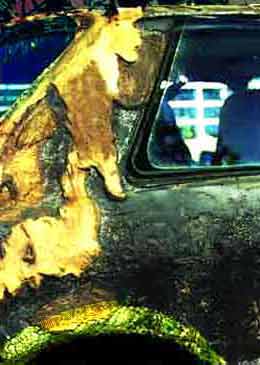
Life Cell
Pauline Burchfield
His car was his life cell. It moved him. It contained him. Every seven years he would shed one cell for another. Every cell had the same basic requirements. It needed to run, carry a minimum of necessities and be low maintenance.
His first was a Woody. He wanted it in his teens. He bought it in his twenties. It carried his art supplies from New Mexico to San Francisco and back.
The front was jammed with paper -- leads on places for art shows, campsites, free meals; remnants of places he'd been-art store receipts, tootsie roll wrappers, toilet paper, maps and brochures; junk mail he'd collected from various P.O. boxes; poems he'd penned on the back of napkins; eviction notices he'd ignored until they threw him out; and a well thumbed copy of "The Time Machine" -- missing its cover. There wasn't much room for a passenger upfront, even in the old days. But the mattress in the back, that still smelled like his first dog, was always open.The cook station was not far from the bed. A metal Coleman cooler, dented and missing its lock, was stored with the stove, within quick reach under the plywood box that supported his mattress. Dirt encrusted grease caked the Coleman stove. A can of white gas stood nearby.
He never worried away any of the old piles he stored in his cells. He just transferred them, lock, stock and barrel. The white gas stove, he eventually ditched when he nearly fried himself. The only other thing that went was his divorce papers. He let them flutter out the window, page by page in a desert windstorm just outside of Lancaster, California. Watching them fly was sheer poetry. He should have written it down, right then -- the poem on letting go. But he didn't. Instead he sat in the mountains that afternoon, damning the greenery for making him forget the desert. He was in his third cell by then, an old chevy truck, whose truck bed made for a first class view of the stars. The trouble was-he couldn't see them without glasses. He pondered that with a pen knife and cleaned the dirt out from under his fingernails. He scratched his name in the dark on the picnic table. He couldn't find it in the morning.
He burnt out three trucks, his back and his knees, hauling art from two-bit show to two-bit show. He could draw Social Security, if he had an address. He considered that, if only for Medicare. He was swallowing too many aspirin these days.
He switched to a well-used station wagon instead. He had a backlog of art to peddle from his younger days, but the wagon was as old as the art. Its springs squeaked. It burned gas. It wasn't firing on all pistons. It was leaking oil. His hands were too gnarled from arthritis to do any major repair. He'd kick it in its sides when it wouldn't run. It didn't help. It only made him limp more than he already did.
The mattress was getting rank. He tried sleeping in motels just to escape the smell of the dog. But it felt too out of body to let him rest well. He couldn't dream. That scared him.
He was sure that the sign outside said "Motel," but only the fleas seemed familiar. The parking lot was sand. The wagon looked at home sitting there. He hoped it wouldn't get too comfortable. He walked outside and looked at the road ahead. The desert heat made the road radiate.
He opened the door and tossed a new map onto the pile on the passenger seat. The pile looked like it would fall over and bury him once he sat down. He sighed and walked around to the other side. He opened the door, grabbed the map off the top, put it in his pocket, and began pulling out pieces of the pile onto the sand. Half-way through, he rescued his copy of "The Time Machine."
He had a grown son back in New Mexico. He'd drop in on him from time to time just to see what he was doing and where he was going. He didn't seem to be doing much or going anywhere.
He got back in the wagon, put on his glasses and stared at the map. He couldn't see, so he gave up looking. He fooled with the knob on the radio, but could only find music in a language he no longer remembered. He listened anyway. At least it had a beat.
He turned the key several times to get a spark. The wagon was on its last legs, but it still ran. He'd have to trade it in when he got to Carlsbad. The thought gave him chills.
He patted the book by his side and backed out the drive and gave one last look to the pile beginning to disassemble in the wind. Poetry. Sheer poetry. He'd have to write it down someday.